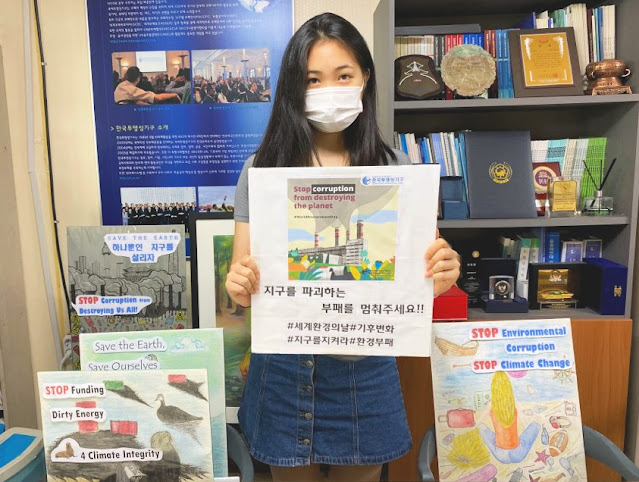What Can Youth Do for Climate Issues?
Written by: Lynn Lee (high school student intern, July 2020)
As a youth, it’s easy to feel powerless. Many of us can’t drive, much less vote. But climate change is a pressing global issue. If we don’t act now, it might be too late.
Where to start? Well, building a strong foundation is critical.
What is the science behind climate change? Why are we on a strict timeline? There is a wealth of information available online to answer these questions.
Transparency International’s e-learning course offers a good starting point, while organizations such as National Geographic and BBC also provide simple guides for beginners.
For those more inclined to visual or auditory learning, YouTube videos (e.g., Our Planet), TED Talks (e.g., Why I live a zero-waste life, Lauren Singer), and podcasts (e.g., Costing the Earth) are available for anyone to access. Full-length films such as Before the Flood, An Inconvenient Truth, and The True Cost are also eye-opening.
Keeping up with the news allows us to see the exacerbating effect of climate change on world disasters. Informed citizens inform others, and together they build informed policies.
Besides building a strong educational foundation, there are many actionable items one can take to push leaders towards climate action.
First, the small things. Online footprint calculators not only estimate your environmental footprint but also provide suggestions on how to reduce it going forward.
The small things boil down to “Reduce, Reuse, Recycle”. Reduce comes first, and it is a way that we can vote with our dollar. Reducing consumption can prompt corporations to respond accordingly.
Reduce your use of single-use items (cups, bags, straws, etc.) if possible. Perhaps stores will reduce their purchase of them as a result. According to the UN Environment, only 9% of plastic waste produced — ever — has been recycled.
Reduce your shopping by thinking before you buy. Do you need that item? Quality over quantity: lean towards clothing pieces that will stand the test of time, instead of opting for fast fashion. BBC reported that the garment industry uses more than the combined energy usage of aviation and shipping.
Reduce your fuel usage. Leaning toward public transportation over private transportation is not only cheaper but also more energy-efficient. If enough people make the switch, governments may divert more of its budget towards public transportation and the clean energy sector.
However, reducing on an individual scale will not make a huge impact. You are making this into a movement will.
Vote, if possible, for politicians who pledge to address climate change (e.g., through the Green New Deal). Even if you can’t vote, there are ways to be politically involved.
Participate in a climate event (strike, rally, panel, etc.), whether it is in-person or digital. For example, Seoul has a youth-led group called Youth 4 Climate Action South Korea that regularly engages in campaigns.
Other than participating directly, you can urge governments to change. Hold officials accountable. Sign and share petitions, write letters to public officials and canvass for climate leaders.
It’s easy to feel powerless, but it’s not too difficult to make small changes. Technology has made it easier than ever to share information, participate in live climate change events, sign petitions, send letters, and engage in protests.
So why not start now?
*****
Reviewed by: Abraham Sumalinog

Comments
Post a Comment